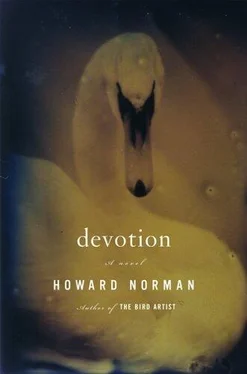In Mrs. Dhomhnaill’s view — she sent home weekly reports — David’s l ’s looped too widely, his b’ s were erratic, his z ’s shopworn. David admitted that she had an inventive vocabulary when describing flaws in a student’s handwriting. She didn’t regularly single David out in her critiques, though once she flapped his open notebook in midair, saying, “Now this is a cursed example!”
“What are the symptoms again?” Dr. Steenhagen said.
“Stomach clenches up. Headaches, sometimes. Can’t sleep the night before, like I said.”
“Have you discussed this with his teacher?”
“I don’t wish to embarrass my son.”
Dr. Steenhagen turned to David in the examination room. “Son,” he said, “there’s nothing to be embarrassed about. You can’t be good at everything. You’re very good with a camera, your mother tells me. Look at my handwriting.” He showed David a scribbled notation on a prescription pad. “See, I’ve done all right in life, and my handwriting’s like barbed wire.”
Humiliated as he was, this made David laugh. He looked out the window at the family car in the parking lot. He wanted to take a nap in it. Dr. Steenhagen followed David’s gaze. “Isn’t that your Buick, Mrs. Kozol?” he said.
“Yes, it is.”
“Beautiful automobile. Smooth ride, I bet. It’s what, about ten years old? Let’s go out and have a look, shall we?”
Puzzled, they followed him through the waiting room and out to the lot. He had his stethoscope around his neck. When they got to the car, he opened the passenger-side door and leaned in. He whistled appreciatively at the plush interior, then took note of the word “Dynaflow,” which moved in elegant silver-metal cursive across the dashboard. “Just as I thought,” he said, as if making a diagnosis. “David, do me a favor. Sit in the front seat here.” David looked to his mother for permission; Ardith smiled and nodded yes. David slid into the front seat. “Now, David, close your eyes,” Dr. Steenhagen said. “That’s good. Now, I’m going to lift your hand to the dashboard. Okay, feel the metal writing? That’s Dynaflow”—he elongated the word like a TV sales pitch. “You must’ve read it a million times, right?” He let go of David’s hand. “You run your pointer-finger over it a few more times. Then open your eyes.”
When David opened his eyes, he stared at the word, really seeing it for the first time. “Since your son’s nemesis seems to be his cursive example,” Dr. Steenhagen said, “well, practice makes perfect.” David got out of the car. Dr. Steenhagen put his hands on David’s shoulders, looked him straight in the eye. “Here’s some advice from your family doctor, young man. When you get home, sit in the front seat of this car and take out a pencil and paper and copy out the word ‘Dynaflow,’ oh, let’s say one hundred times. You saw how perfectly it’s written on the dashboard. I guarantee, if you do this every day for a week, you’ll get a tenfold improvement in your cursive example, maybe twentyfold.”
It did not strike Ardith as plausible advice, but it was doctor’s advice, and David took it to heart. This appointment was on a Friday. As it happened, between Friday evening and the following Wednesday evening David wrote “Dynaflow,” by his own count (using ////to represent 5), 1,015 times. The middle finger of his right hand formed a callus, actually bruised up a little. He experienced only the mildest hint of nervous stomach Wednesday night, took some Pepto Bismol and slept for six hours, until Ardith woke him for breakfast.
The problem was, “Dynaflow” was rooted so deeply in his mind that when that week’s cursive example took place, David unconsciously inserted it midsentence in a dictated paragraph from the Book of Genesis. Reviewing the collective examples while the students did arithmetic problems, Mrs. Dhomhnaill was duly impressed to see how much David’s handwriting had improved. On the other hand, she was perplexed by his inclusion of “Dynaflow” (whose common usage was unknown to her). She decided not to address it with David but to subtract half a grade. He received an A-minus.
The swans had settled down. Back in the guesthouse, David percolated coffee. He wrote in his notebook, If I’d been devoted to my marriage, I would not have —, stared at the page until the coffee was ready. He sat on the porch sipping coffee. He went back to the kitchen, closed the notebook, took up The Crime of Sylvestre Bonnard. His headache spiked in intensity two or three times but otherwise was manageable, and it disappeared by 5:15 in the morning, just as he finished the novel.
He then stood at the open screen door and stared out at the darkness, now filtering a little dawn light through the mist. He reached into the back pocket of his khaki shorts, removing the photograph the doorman had taken of him and Maggie together in front of Durrants Hotel the first morning they spent together, more than a year ago. In the photograph, David looked disheveled, harried; he was touching Maggie’s hand, not holding it; Maggie’s eyes were somewhat squinted up; she looked breezy, alert and pleased. They were more huddled together than embracing, but definitely out in public together, in the sunlight after a night of rain.
David slid the photograph back inside the transparent plastic pocket, set the wallet on top of the peaches, pears and apples in a bright yellow bowl on the kitchen table. This was where he always put his wallet, in that bowl. It had become habit. Now, which one next? he thought, approaching the stack of novels on the counter. He ran his finger along the spines, then pulled Manuscript of a Country Doctor out, immediately balancing the others in their column. Maggie told me this was one of her favorites.
THE DOORMAN WHO had taken their photograph was named John Franco. That morning, Maggie handed him her pocket-size tourist camera. John Franco snapped a picture, then opened his palm for a tip. “Joking,” he said when Maggie narrowed her eyes and took back the camera. Ever alert, he turned to another couple getting out of a taxi; the trunk popped open and John Franco lifted out two suitcases. Maggie put her camera in her Dutch schoolbag. She and David went back inside the hotel to have breakfast.
It was 9:30 A.M. They had slept later than either had done in years, though they’d been awake, except for brief naps, until dawn. In the dining room an Indian woman sat alone reading the Guardian, a stack of Penguin paperbacks secured by twine on her table. Across the room a family — mother, father, lanky teenage daughter — spoke in German. David and Maggie chose a table at the street-side window. The waitress arrived. Maggie ordered orange juice, coffee, a cranberry muffin, a slice of melon. David ordered coffee and oatmeal—“hot cereal” on the menu. When the waitress left to put in the order, David suggested they cancel breakfast and go back to Maggie’s room. “I wouldn’t hesitate a moment,” she said, “except there’s a London Times cultural reporter coming to rehearsal this morning who I’ve got to talk with.” She looked at her wrist, raising her eyebrows at having forgotten to wear her watch. “I’ve got to be at the hall by eleven. And where do you have to be, David?”
The waitress set down their breakfasts. She poured coffee for them both. “I have to go to my flat and work on a book proposal,” he said.
“Book proposal. For what book?”
David told her about Josef Sudek. His dates: 1896–1976. How he had lost an arm in World War I. How he was closely associated with Prague. How he’d attained fame mainly toward the end of his life. David condensed his knowledge of Sudek in as resonant a summary as possible, wanting Maggie to feel he was capable of wholehearted devotion to an intellectual endeavor. It felt urgently necessary. He didn’t know all the reasons why. “I’m really thinking of this project night and day,” he said. An exaggeration he desired to be plain fact. “Can I show you some of Sudek’s photographs later on? In a book, I mean.”
Читать дальше












